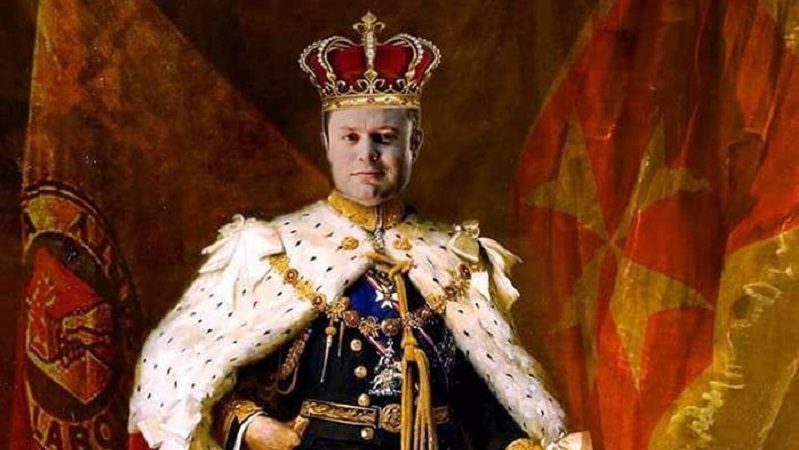There’s a joke by Emo Philips that goes “I asked God for a bike, but I know God doesn’t work that way. So I stole a bike and asked for forgiveness.”
This cracked me up when I first heard it. Perhaps because in humour, for all its subversions and inversions, there is almost always a baseline of truth.
In this case it succinctly illustrates the notion that you might well feel you can act with impunity when safe in the knowledge that someone, or something, will excuse or absolve you of any wrongdoing. Or better yet, if someone will take the fall for you.
Certainly Christianity predicates itself on the idea that one person was humanity’s scapegoat, onto which we loaded our sins, before destroying him, simultaneously absolving us collectively of our culpability while trapping us individually into a sort of Stockholm syndrome of worship for the person who “saved” us.
This idea is also the mainstay of colonialism – often underpinned by religion.
Colonisers, for example, have notably always had political and legal dominion over an alien society, over the relations of economics and political dependence, over the education system and the arts, and have always exploited the racial and cultural inequalities of the colony because – as we all know – you need to divide before you can fully conquer.
Occupying the dual roles of great messiah and chief coloniser is Joseph Muscat – and you’re either with him and his empire, or against them. Forget the mantra by an unknown Ramona Attard before the election – then compensated by a role at the communications desk of the Office of the Prime Minister – that “you can not agree with the Labour Party, but you can work with it”.
Like colonisers before them, the present administration is robbing the Maltese blind, selling off the land to foreigners, sharing the spoils among themselves. Like colonisers before them they’ve bought the people with false promises and lies and, thus mollified, the Maltese quietly acquiesce.
To adapt Napoleon’s phrase to the purpose: The religion of Muscat is excellent stuff for keeping common people quiet. Muscatism is what keeps the poor from murdering the rich.
So it is that Muscat’s minions, now sufficiently duped, tie themselves into knots to ‘keep the faith’, readily forming opinions on things like the Egrant inquiry without actually reading it. They accuse government critics of being apostates and bay for their blood while the cult leader himself (and his wife) steadfastly avoids interviews except for those with paid-off journalists, while organising an inquisition of his own to hunt down ‘heretics’.
They won’t be troubled by minor details like facts, and when you confront them with any you can almost hear their minds strain under their own cognitive dissonance as they struggle to reconcile the indisputable with the undesirable, resorting instead to bullying, discrediting and dehumanising their critics, as they did to Daphne Caruana Galizia until she was assassinated.
Perhaps most symbolic of this cultural poverty is the tacit acceptance of all this by the artistic community. Artist Anish Kapoor, on a walk of compassion for refugees in London in 2015, said “it is important that artists are not outside the equation, we don’t stand on the sidelines. Artists are part of the story of a response, we cannot stand aside and let others make the response”.
What response have we had from Malta’s singers, dancers, actors, comedians, playwrights, film-makers to anything really? If artists are typically the conscience and soul of a community, then what does this say about Malta’s soul? A petition was signed by Maltese artists to support an international call for the dismissal of V18 chairman Jason Micallef – a number of those who signed it, did so anonymously.
Where are the protest songs? The Brechtian-style theatre pieces? The documentaries? Where are the Ira Loscos, the Red Electricks, the Emma Muscats, the Joseph Callejas of this island with their creative voices on the matter?
Where the comedians? Why is the enfant terrible of theatre Adrian Buckle not commissioning or producing relevant plays about it? Is censorship only a concern when it affects their own production? Is a restriction on press freedom not censorship?
As Victor Hugo famously put it: ‘There is in every village a “torch” (the teacher) and an “extinguisher” (the priest).’ The “torch” in this case being any critic or dissident, and the “extinguisher” being the great Church of Joseph – the Maltese government.
Aside from a few pithy (and entirely accurate) remarks from commentators on social media like Mario Vella, a show from Comedy Knights, and the sharp work of people like Sebastian Tanti Burlo and Steve Bonello, there has been worryingly little protest art.
Until the Maltese have developed independent thought, assumed individual and political responsibility, and developed a cultural scene of artists with backbone that give the Maltese identity an authentic voice instead of pandering sycophancy, the abysmal truth is that Malta will always be a colony – of its own making.













